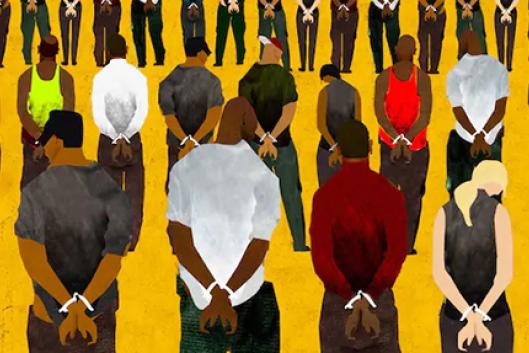What is considered a crime is coupled with what does not count as a crime. What people call “violations of people’s rights” are often straightforward crimes. Likewise, most of the so-called “differentiated impacts” that woman must bear due to the imposition of any extractive industry should be called out for what they are: crimes.
What is a crime? According to the dictionary, a crime is “an illegal act for which someone can be punished by the government.” But, then, what is considered “an illegal act”? And who decides?
What is considered a crime is thus always coupled with what does not count as a crime. And vice versa.
The tactics and strategies employed to impose land control and extractive operations in the forests are many. They vary as much as the ways used to dispossess peasant communities and indigenous peoples from their territories, livelihoods and communal cultures. Most of these tactics and strategies are criminal acts. Yet, in the public perception (and by enforcement agencies), they are considered non-criminal or legitimate, justified with discourses of ‘national development,’ ‘job creation,’ ‘low carbon development,’ ‘progress’ and so forth.
The previous WRM bulletin edition (1) reflects on what is miss-named development, and warns about the strategies that actors promoting it use to take control of territories. This bulletin focuses on yet another side of this story.
Considering particular actions and decisions from corporations, multilateral banks and governmental agencies as non-crimes goes hand in hand with the criminalization of most dissent and resistance on the ground. Who gets to decide on what should be considered criminal and what not, is very interlinked to power.
In this sense, the capitalist economy is based on the structurally racist and violent oppression of workers, women, peasants and forest-dependant populations in the global South. This oppression (and its perpetrators) is however perceived by most courts and dominant discourses as legitimate or non-criminal. An article in this bulletin exposes how the violence and abuse against women is part and parcel of the industrial plantation model and at the base of how companies generate profit. This abuse largely stays invisible for consumers and investors, leaving perpetrators commit their crimes without consequences, and keeping the violent colonial plantation model intact.
Criminal acts from public or private actors happen constantly around the world in quite diverse forms and within different layers of societies. Another article in this bulletin exposes how many perfectly legal but corrupt practices are routine within government and companies, frequently even passing for ‘good governance’ or being the stated mission of public bodies.
Indonesia is a case in point. The implementation of neoliberal economic policy in the late 1960s was led by a group of Indonesian economists who studied at the University of California, Berkeley. One economist in this group, dubbed the Berkeley Mafia, boasted that they presented a ‘cookbook’ of ‘recipes’ to Soeharto. The ‘success’ of US-backed anti-left violence that shocked the public into accepting the imposition of a neoliberal, right-wing regime, turned the Mafia’s cookbook into a portable method. Only five years after Soeharto took the presidency, graffiti appeared in Chile prior to the US-backed coup that ousted socialist Salvador Allende. The Graffiti read “Jakarta is coming.” (2) Now it seems that Jokowi, the current president of Indonesia, is reopening the Berkeley Mafia’s cookbook with the controversial Omnibus Law. An article in this bulletin reflects upon this Law and highlights the voices of six activists from across the islands who have been resisting this ‘cookbook’ for decades.
Another example is the case of Brazil, where land grabbing has been -and still is- part of a strong system of organized crime. There, the word grilagem is used when referring to the illegal creation of property titles for public lands, giving them a legal appearance. A criminal practice that began in colonial times with the theft of indigenous peoples’ lands, and that continues to be widely used by big capital. An interview with a member of the Pastoral Land Commission (CPT, for its Portuguese acronym) reflects on the tactics used by the company Amapá Celulose (AMCEL), which is one of the few large tree plantation companies in the Amazon. AMCEL's FSC-certified eucalyptus plantations produce and export wood chips for the pulp industry and for energy production, among others, to Denmark.
Another article in this bulletin highlights the legalized criminal acts that occur in Thailand, where the political prominence of the military and the state’s own authoritarian leanings decide what is and what is not to be considered a crime. The article shows various cases where the law has been used to criminalize Thai forest-dwelling communities' resistance against land grabbing in recent years. The article shows the harsh consequences for community activists when resistance is criminalized in order to protect interests of big capital and a political elite.
But other actors in society also influence what is considered a crime and what passes as a legitimate practice. One example is the certification schemes. An article in the bulletin shows how the RSPO label, which issues certificates for industrial oil palm plantations with standards of ‘sustainability’, is run by the same producers who are then judged by it. Besides, the legitimacy of the state to set laws is weakened by the argument that the market should set standards of ‘sustainability’. This legitimizes monoculture plantations, the management of which all too often involves one crime after the other.
What people usually call “violations of people’s rights,” for example, are often straightforward crimes that should be prosecuted. Likewise, most of the so-called “differentiated impacts” that woman must bear due to the imposition of industrial plantations or other extractive industries should be called out for what they are: crimes.
It is time to name the crimes and the criminals for what they are.
(1) WRM Bulletin 252, Development Banks: Financing Dispossession and Exploitation, November 2020
(2) Lausan, Jakarta is returning: The ‘neoliberal cookbook’ that guides Indonesia’s Omnibus Law, 2020
